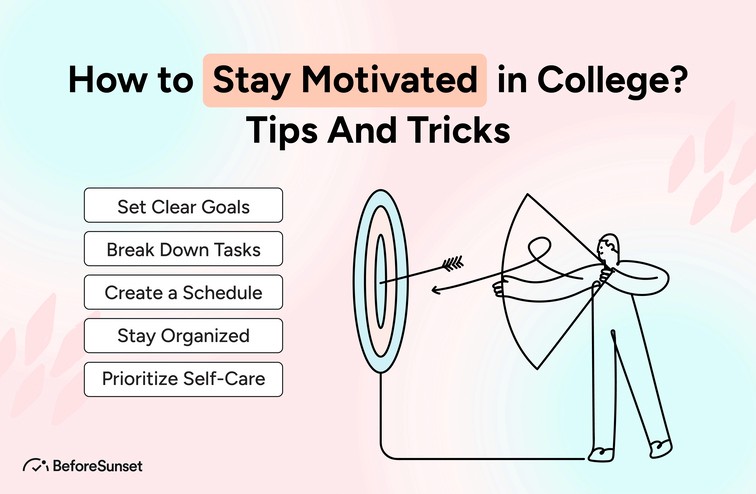Starting college as a college student is a thrilling but sometimes difficult phase of life that is characterized by rigorous coursework, possibilities for personal development, and a wealth of experiences. It can be difficult, nevertheless, to stay motivated during this pivotal time due to the demands of school, a variety of obligations, and the attraction of diversions.
This "How to Stay Motivated in College" blog provides insightful advice on navigating the academic environment with zeal and purpose. These tips, which range from creating a supporting network and establishing clear goals to prioritizing self-care and using productive study techniques, are meant to enable students to not only make it through college but to flourish.
This blog provides students looking to make the most of their college experience with a road map for overcoming typical obstacles and boosting motivation, so they may graduate from college not just academically successful but also personally fulfilled. Because a college degree and reaching your academic goals for your future career are important but there is more to college life than study sessions and busy schedules.

Setting Goals
Establishing objectives is an active activity that is essential to developing self-motivation. Goals are first and foremost a road plan that gives direction and clarity in both the personal and professional spheres. By outlining your goals, you remove uncertainty and provide a clear course of action that gives you a feeling of direction. This feeling of purpose directs your efforts toward certain goals, acting as a motivating compass.
Setting objectives also stimulates intrinsic motivation, which is an inner drive derived from one's own emotions, values, and interests. You're more likely to have a strong sense of dedication and fulfillment when your goals are in line with these inherent elements. Since intrinsic motivation comes from inside and develops into a strong force that propels you ahead, it is typically more enduring than external motivators.
You may methodically monitor your development by setting quantifiable targets. Having observable outcomes not only gives you a sense of validation but also acts as a visible record of your progress. Recognizing little accomplishments along the road generates consistent motivation spikes, generating a positive feedback loop that motivates sustained effort.
The pursuit of objectives inevitably involves overcoming obstacles. Setting and completing goals requires overcoming challenges, picking up lessons from failures, and persevering through hardships. The development of resilience and a growth mindset—two essential elements of long-term motivation—is facilitated by this process. Every obstacle you overcome becomes a chance for improvement and education, strengthening your will to accomplish the objectives you've set.
Achieving your goals increases your self-efficacy, or your confidence in your capacity to complete tasks and overcome obstacles. This enhanced self-assurance sets off a self-reinforcing loop in which your confidence grows as a result of accomplishment and inspires you to take on new tasks.
Establishing objectives also helps you feel in charge of your life. You proactively design your destiny by striving for certain results, as opposed to being a victim of events. This empowerment may give you a sense of agency and control over your choices and behaviors, which can be naturally inspiring.
Furthermore, goal-setting promotes constructive vision. By setting clear goals, you visualize achievement in your mind. Your dedication to bringing those thoughts to life is strengthened by the inspiration and wonderful feelings this visualization inspires.
Adding a deadline to your goals makes them feel more urgent, keeps you from putting them off, and gives you a set schedule for completion. In addition, the discipline needed to pursue goals effectively improves time management abilities, enabling you to organize your workload and use resources effectively.
Create a Routine and Stick To It
The foundation of both personal effectiveness and well-being is a routine establishment. A clear routine offers structure, stability, and a sense of control, whether you're managing a hectic work schedule, aiming for a better lifestyle, or both. A routine serves as a dependable anchor in an unpredictable environment, assisting with time management, work prioritization, and focus maintenance.

Make Time For Exercise
Making the time to exercise may seem like a difficult chore in the busyness of everyday life, but it is an investment that will pay off in terms of your physical and emotional health.
Frequent physical activity has been linked to a host of health advantages, such as better stress management, elevated mood, higher energy, and cardiovascular health improvements. Setting aside time for exercise is essential for maintaining a balanced and healthy lifestyle, not simply for aesthetic reasons.
It's crucial to prioritize exercise, set out time for it in your hectic schedule, and treat it with the same priority as other obligations. Whether it's a yoga class in the evening, a lunchtime workout, or an early jog, creating a regular schedule encourages habit-building.
Taking the stairs, going for walks during breaks, or choosing active transportation wherever feasible are all easy ways to incorporate physical exercise into everyday life.
Furthermore, you'll have more flexibility in incorporating exercise into your schedule if you accept and acknowledge its variety. There are several possibilities available, ranging from yoga and leisure sports to strength training and aerobic activities. Creating a workout regimen that suits your tastes and hobbies will make it more likely that you will stick with it over time.
Another important thing is to create a supportive environment. Find a training partner, enlist the assistance of friends or family, or enroll in a fitness class to incorporate social elements into your exercise regimen. This increases the fun factor and establishes a level of accountability.
Set Up a Study Space
Establishing a productive and focused study area is essential to creating a positive learning atmosphere. If you're a student getting ready for a test or an individual working on a project, having a tidy study area may greatly improve your capacity to process information and complete tasks. Here's how to set up the ideal study room step-by-step:
1. Choose the Right Location:
Choose a space that is calm, cozy, and free of distractions. To reduce disruptions, it is ideal for this area to be isolated from busy areas.
2. Ensure Good Lighting:
To lessen eye strain and provide a well-lit atmosphere, invest in bright, adjustable lighting if natural light isn't an option.
3. Invest in Comfortable Furniture:
Make use of a roomy desk that can hold your study supplies and a cozy chair. To prevent pain during extended study periods, ergonomics is essential.
4. Organize Study Materials:
Have all of your study essentials close at hand. To clean and arrange books, notes, pencils, and other materials, use organizers, shelves, or drawers.
5. Cut Down on Distractions:
Determine and reduce any possible distractions in your study area. Switch off any unused equipment, put your phone on quiet, and let your family members know that you will be studying for a specific amount of time.
6. Personalize Your Space:
Incorporate unique elements to create a welcoming and inspiring environment. Accent your space with inspiring objects like artwork, plants, or inspirational phrases.
7. Use a Whiteboard or Corkboard:
For to-do lists, visual aids, or essential reminders, install a whiteboard or corkboard. This aids in maintaining your organization and goal-tracking.

Plan Out Your Days and Weeks
It's critical to plan out your days and weeks in order to be productive, stay focused, and develop a sense of control over your life. This tactical method guarantees effective time management, enabling people to rank jobs according to their importance and due dates.
People may optimize their schedules and reduce the likelihood of feeling overwhelmed by defining specified time blocks for different tasks, making well-organized to-do lists, and having clear goals in place. Furthermore, well-thought-out planning offers a path forward, enabling people to monitor their progress, reevaluate their objectives, and make required corrections.
Because it encourages a proactive rather than reactive mentality, this methodical approach not only increases productivity but also lowers stress levels. In the end, the value of organizing one's days and weeks comes from its ability to translate goals into concrete acts, enabling people to carry out their duties effectively and with intention.
Take Breaks to Recharge
Taking breaks is essential to sustaining both general well-being and productivity. Persistent task involvement can cause mental exhaustion and performance deterioration. Breaks provide you a chance to refresh and regenerate, enabling your mind to clear and refocus.
Taking brief walks, practicing mindfulness regular exercise, or simply leaving the office can all help to improve cognitive function, creativity, and problem-solving skills. They are also essential for maintaining long-term motivation and avoiding burnout.
People who include frequent breaks into their daily routine not only become more productive but also promote a better work-life balance, which in turn leads to better mental and physical health.
The secret to maintaining energy levels and maximizing overall effectiveness in both professional and personal endeavors is to embrace breaks as a need rather than a luxury.

Find an Accountability Partner or Study Buddy
Having a study companion or accountability partner may greatly improve your motivation, concentration, and general productivity. This cooperative method fosters support and encouragement between participants, transforming the sometimes lonesome act of working or learning into a shared experience.
By keeping you accountable for your commitments, an accountability partner acts as a dependable source of inspiration, assisting you in staying on track with your objectives. There is positive pressure to fulfill deadlines and reach milestones since everyone feels responsible for one another.
Additionally, having a partner with whom to work through ideas, explain concepts, or just share progress provides a social component to learning or work, lowering feelings of loneliness and promoting a sense of camaraderie. An accountability partner, be it a friend, student, or coworker, may make the process of achieving your goals a more cooperative and fulfilling undertaking.
Manage Distractions and Self-Doubt
Overcoming self-doubt and navigating distractions are frequent obstacles in the way of both professional and personal progress. The capacity to control distractions and overcome self-doubt has become essential in a time of continual stimulation and outside influences.
Distractions may hinder productivity and attention whether they originate from the digital world, external causes, or internal thoughts. Self-doubt may undermine confidence and impede growth at the same time.
Limit Social Media Use and Other Distractions
Notifications, social networking sites, and other internet diversions may readily draw one's attention away from tasks, which lowers productivity and increases stress. Setting limits on social media use facilitates devoted time for study or work, which improves time management and attention.
It's critical to recognize and reduce other distractions as well, whether they originate from external sources like external noise, excessive multitasking, or internal ones like self-doubt.
People may increase work completion rates, recover time, and feel more in control of their everyday lives by consciously controlling these distractions. This proactive approach fosters a more aware and meaningful living by improving productivity and promoting a healthy work-life balance.

Don’t be Afraid to Get Help When Needed
Strength in Weakness: Acknowledge that asking for assistance is a brave gesture that shows awareness of oneself and a readiness to face difficulties. It emphasizes your dedication to development rather than weakening your strength.
Obtaining Resources: Recognize that there are a variety of options accessible, such as professional services, support networks, mentors, and coworkers. By asking for assistance, you may get a lot of information and support.
Learning Opportunity: Consider asking for assistance as a chance to develop and learn. Diverse viewpoints and life experiences might offer insightful information that can improve your ability to overcome obstacles.
Solving Problems Effectively: Seeking assistance encourages teamwork, which is frequently essential for addressing problems successfully. It gives you the ability to draw on a group's creativity and knowledge to come up with original ideas.
Enhanced Well-Being: Recognize how important it is for your mental and emotional well. To keep a good balance and avoid burnout, it is proactive to ask for support while facing personal or professional difficulties.
Reduced Stress: Early problem-solving and support can stop problems from getting worse and lessen stress in general. Assisting others with the weight of the load reduces it and makes obstacles easier to handle.
Building Connections: Understand that asking for assistance improves and deepens relationships with people. It builds a network of people who help one another by fostering a sense of community and mutual aid.
Eliminating Stigmas: Face the stigmas associated with asking for aid in society. Accept the notion that asking for help is a normal and essential aspect of both professional and personal development.
Acknowledging Restrictions: Recognize that everyone has limits. By being open and honest about your own shortcomings, asking for assistance enables you to work with people whose expertise and experience may be complementary to your own.
Mental Health Support: Put your mental well-being first. Seeking professional assistance if you're experiencing emotional difficulties is a proactive step in comprehending and managing your mental health.
Team Dynamics: Asking for assistance in the workplace promotes a positive team environment. It fosters candid communication, mutual respect, and a culture of cooperation, all of which improve the well-being and output of the workplace.
Constant Development: Adopt an attitude of constant improvement. Seeking assistance is a continuous process that is consistent with the knowledge that there is always space for growth and development.
Acknowledge Small Achievements Along the Way
Rewarding yourself for little victories along the road is essential to staying motivated and cultivating an optimistic outlook. Acknowledging and appreciating even the little successes along the way to bigger objectives helps you get better feedback on your progress and improves your self-esteem.
By pausing to recognize these minor victories, you establish a positive feedback loop that sustains effort and fosters a sense of success. By dividing more difficult activities into smaller, more achievable segments, this technique helps the final objective appear less intimidating.
Furthermore, acknowledging minor victories makes the process happier and more fulfilling, making pursuing your objectives a more fulfilling experience. In the end, recognizing little victories helps build resilience, maintain drive, and increase one's feeling of overall success.

Reward Yourself for Progress Made Toward Your Goals
Giving yourself a reward for each step you take toward your objectives is a great way to keep yourself motivated, promote good behavior, and improve your general well-being. No matter how large or little, celebrating your accomplishments gives you a concrete validation of your diligence and hard work.
By acting as a kind of positive reinforcement, these awards support your goals and motivate you to keep working toward them. Treating yourself as you reach milestones brings happiness and contentment to your path, making the pursuit of objectives more pleasurable.
It also facilitates the development of a mindset that sees hurdles as chances for progress rather than as barriers to overcome, which helps you associate your efforts with success.
Rewards may take many forms, but adding them to your goal-setting process can help you create a more balanced and satisfying approach to your professional and personal growth. Some examples of rewards include little indulgences, breaks for your favorite activities, or moments of relaxation.
BeforeSunset AI: Collage Students' Favourite
Do you need motivation? Look no further BeforeSunset AI is here. With BeforeSunset AI, planning your day has never been easier. Make college life a breeze. What are you waiting for? Try it out today!

